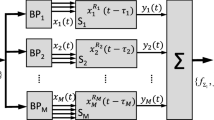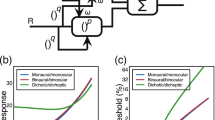Abstract
THE averaging of often very small responses is widely used in physiology, psychology and clinical medicine to evaluate stimulus threshold levels. It is sometimes difficult to recognise responses in the average waveform because of residual activity, so a means of improving sensitivity and objectively recognising positive responses would be useful. We have previously found1 that the averaged responses (ERA) evoked in the electroencephalogram (EEG) of a subject by auditory stimuli were produced by imposing a phase constraint on the different Fourier harmonics of the spontaneous EEG, without necessarily influencing their amplitudes.
This is a preview of subscription content, access via your institution
Access options
Subscribe to this journal
Receive 51 print issues and online access
$199.00 per year
only $3.90 per issue
Buy this article
- Purchase on Springer Link
- Instant access to full article PDF
Prices may be subject to local taxes which are calculated during checkout
Similar content being viewed by others
References
Savers, B. McA., Beagley, H. A., and Henshall, W. R., Nature, 247, 481 (1974).
Author information
Authors and Affiliations
Rights and permissions
About this article
Cite this article
SAYERS, B., BEAGLEY, H. Objective evaluation of auditory evoked EEG responses. Nature 251, 608–609 (1974). https://doi.org/10.1038/251608a0
Received:
Revised:
Issue Date:
DOI: https://doi.org/10.1038/251608a0
This article is cited by
Comments
By submitting a comment you agree to abide by our Terms and Community Guidelines. If you find something abusive or that does not comply with our terms or guidelines please flag it as inappropriate.



